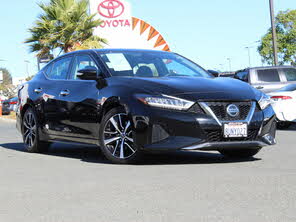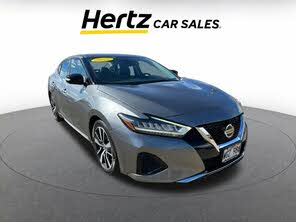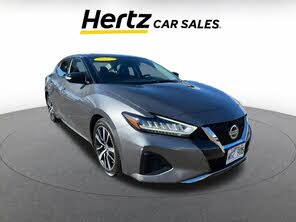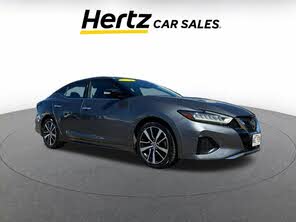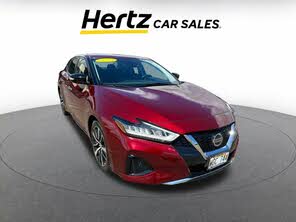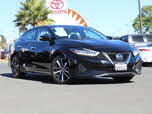2020 Hyundai Elantra vs 2021 Nissan Maxima
Overview | |
MSRP$19,300 | MSRP$37,090 |
Average price$14,601 | Average price$23,409 |
Listings1482 | Listings327 |
Ratings & Reviews | |
User Reviews | User Reviews |
Expert reviews8.3 out of 10 | Expert reviews7.3 out of 10 |
Pros
| Pros
|
2020 Hyundai Elantra Reviews SummaryHyundai isn’t pulling any punches when it comes to the compact car segment, where value is of utmost importance. And though a completely redesigned 2021 Elantra is coming soon, the automaker bestows several value-enhancing improvements upon the outgoing 2020 Hyundai Elantra compact sedan. They include free scheduled maintenance, improved fuel economy ratings, and new standard safety features. | |
2021 Nissan Maxima Reviews SummaryThe 2021 Nissan Maxima celebrates 40 years on sale, making it one of the oldest Japanese automotive nameplates in continuous use. While it’s impressive for any model to survive four decades, the Maxima has spent most of its history mired in mediocrity. The Nissan Maxima name first appeared in 1981 as a rebranding of the Datsun 810 sedan. The original Maxima/810 was a true enthusiast’s car, boasting rear-wheel drive (RWD) and a sporty character that led Nissan to declare it a “four-door sports car.” However, that only lasted for a few years. With its first redesign for the 1985 model year, the Maxima switched to front-wheel drive (FWD) and was positioned as Nissan’s flagship sedan. It’s been that way ever since. Nissan has continued to gesture in the direction of that original RWD model, but for most of its 40 years, the Maxima has been a slightly sportier alternative to full-size sedans like the Toyota Avalon, rather than a BMW beater. So it is with the current, eighth-generation, Maxima, which debuted for the 2016 model year. It enters the 2021 model year with few changes, the most significant being a 40th Anniversary Edition option package for the top Platinum trim level, which sits above the base SV and mid-range SR trim levels. That’s what we test drove for this review. | |
No video found | No video found |
Popular Features & Specs | |
Engine2.0L 147 hp I4 | Engine3.5L 300 hp V6 |
Drive TrainFWD | Drive TrainFWD |
Seating Capacity5 | Seating Capacity5 |
Horsepower147 hp @ 6200 rpm | Horsepower300 hp @ 6400 rpm |
MPG City31 | MPG City20 |
MPG Highway41 | MPG Highway30 |
Engine | |
Engine Name2.0L 147 hp I4 | Engine Name3.5L 300 hp V6 |
Torque132 lb-ft @ 4500 rpm | Torque261 lb-ft @ 4400 rpm |
Horsepower147 hp @ 6200 rpm | Horsepower300 hp @ 6400 rpm |
DrivetrainFWD | DrivetrainFWD |
Fuel Economy | |
MPG City31 | MPG City20 |
MPG Highway41 | MPG Highway30 |
Interior | |
Seating Capacity5 | Seating Capacity5 |
Key Features | |
Navigation System | Navigation SystemStandard |
Safety | |
Front Crash Overall4 | Front Crash Overall5 |
Side Crash Overall4 | Side Crash Overall5 |
Dimensions & Capacity | |
Cargo Space14.4 cu ft | Cargo Space14.3 cu ft |
Curb Weight2844 lbs | Curb Weight3612 lbs |
Height56.5 in | Height56.5 in |
Length181.9 in | Length192.8 in |
Width70.9 in | Width73.2 in |
Wheelbase106.3 in | Wheelbase109.3 in |
Maximum Payload1080 lbs | Maximum Payload1073 lbs |
Number of doors4 | Number of doors4 |
Overview | ||
MSRP | $19,300 | $37,090 |
Average price | $14,601 | $23,409 |
Listings | ||
Ratings & Reviews | ||
User reviews | ||
Expert reviews | 8.3 out of 10Read full review | 7.3 out of 10Read full review |
Pros & cons | Pros
| Pros
|
Summary | Hyundai isn’t pulling any punches when it comes to the compact car segment, where value is of utmost importance. And though a completely redesigned 2021 Elantra is coming soon, the automaker bestows several value-enhancing improvements upon the outgoing 2020 Hyundai Elantra compact sedan. They include free scheduled maintenance, improved fuel economy ratings, and new standard safety features. | The 2021 Nissan Maxima celebrates 40 years on sale, making it one of the oldest Japanese automotive nameplates in continuous use. While it’s impressive for any model to survive four decades, the Maxima has spent most of its history mired in mediocrity. The Nissan Maxima name first appeared in 1981 as a rebranding of the Datsun 810 sedan. The original Maxima/810 was a true enthusiast’s car, boasting rear-wheel drive (RWD) and a sporty character that led Nissan to declare it a “four-door sports car.” However, that only lasted for a few years. With its first redesign for the 1985 model year, the Maxima switched to front-wheel drive (FWD) and was positioned as Nissan’s flagship sedan. It’s been that way ever since. Nissan has continued to gesture in the direction of that original RWD model, but for most of its 40 years, the Maxima has been a slightly sportier alternative to full-size sedans like the Toyota Avalon, rather than a BMW beater. So it is with the current, eighth-generation, Maxima, which debuted for the 2016 model year. It enters the 2021 model year with few changes, the most significant being a 40th Anniversary Edition option package for the top Platinum trim level, which sits above the base SV and mid-range SR trim levels. That’s what we test drove for this review. |
Video | No video found | No video found |
Popular Features & Specs | ||
Engine | 2.0L 147 hp I4 | 3.5L 300 hp V6 |
Drive Train | FWD | FWD |
Seating Capacity | 5 | 5 |
Horsepower | 147 hp @ 6200 rpm | 300 hp @ 6400 rpm |
MPG City | 31 | 20 |
MPG Highway | 41 | 30 |
Engine | ||
Engine Name | 2.0L 147 hp I4 | 3.5L 300 hp V6 |
Torque | 132 lb-ft @ 4500 rpm | 261 lb-ft @ 4400 rpm |
Horsepower | 147 hp @ 6200 rpm | 300 hp @ 6400 rpm |
Drivetrain | FWD | FWD |
Fuel Economy | ||
MPG City | 31 | 20 |
MPG Highway | 41 | 30 |
Interior | ||
Seating Capacity | 5 | 5 |
Key Features | ||
Navigation System | Standard | |
Safety | ||
Front Crash Overall | 4 | 5 |
Side Crash Overall | 4 | 5 |
Dimensions & Capacity | ||
Cargo Space | 14.4 cu ft | 14.3 cu ft |
Curb Weight | 2844 lbs | 3612 lbs |
Height | 56.5 in | 56.5 in |
Length | 181.9 in | 192.8 in |
Width | 70.9 in | 73.2 in |
Wheelbase | 106.3 in | 109.3 in |
Maximum Payload | 1080 lbs | 1073 lbs |
Number of doors | 4 | 4 |
The 2020 Hyundai Elantra, last redesigned in 2017 and restyled in 2019, remained visually unchanged for the 2020 model year. The previous year's restyle introduced a geometric-influenced appearance, setting the stage for the dramatically angular styling of the all-new 2021 Elantra. Available in six versions—SE, SEL, Value Edition, Eco, Limited, and Sport—the Elantra's price ranged from $19,300 to $24,150. Our Limited test vehicle, equipped with the Ultimate Package and floor mats, brought the total to $27,630, including the $975 destination charge. The Elantra GT hatchback was also available for 2020.
A black paint job highlighted the Elantra’s angular headlight, fog light, and wheel designs, contrasting sharply with the chrome grille, beltline, and logo detailing. The result was a stylish small car, though not universally appealing. The interior received an upscale update with silver trim on various elements, but enough hard and glossy plastic remained to remind occupants that it was still a mainstream compact car.
The 2021 Nissan Maxima, as a flagship sedan, set the tone for other Nissan models with its bold styling elements, including a “floating” roofline and “V-Motion” grille. These features were later applied to smaller models like the Altima, Sentra, and Versa. The Maxima distinguished itself with a steeply-angled front end and massive grille, resembling an Art Deco locomotive. Our test car, with its blacked-out trim, looked particularly sinister. The 40th Anniversary Edition featured a two-tone exterior, Ruby Slate Gray Pearl paint, black roof, 19-inch gloss-black alloy wheels, black exterior trim, red semi-aniline leather upholstery, white speedometer and tachometer faces, and heated rear seats.
The 40th Anniversary Edition’s interior was notably dressed up, with dark-red leather seats exuding an 1980s vibe. The white gauge faces were both stylish and functional, proving that not every car needs a digital instrument cluster.
The 2020 Hyundai Elantra featured a base 147-horsepower, 2.0-liter four-cylinder engine paired with a new continuously variable transmission (CVT), replacing the previous six-speed automatic. The CVT, standard with SE trim, contributed to a $1,100 price increase from the previous year. All Elantra models were front-wheel drive. The Elantra Eco had a turbocharged 1.4-liter four-cylinder engine producing 128 horsepower and 156 lb-ft of torque, paired with a seven-speed dual-clutch automatic transmission (DCT) and a new automatic engine start/stop system, achieving 36 mpg in combined driving. The Elantra Sport trim featured a 1.6-liter turbo four-cylinder engine with 201 horsepower and 195 lb-ft of torque, and an independent rear suspension for a superior ride.
Our Elantra Limited test car, with its 2.0-liter engine and new CVT, provided a satisfactory driving experience. Hyundai’s CVT, dubbed the “Intelligent Variable Transmission,” employed a chain belt and a wide-ratio pulley system for greater efficiency and improved responsiveness. However, our real-world testing yielded an average of 29.3 mpg, falling short of the expected 34 mpg. The Elantra’s torsion beam axle rear suspension detracted from ride and handling, giving the car an unsettled feeling. The Elantra Sport’s independent rear suspension offered a more enjoyable driving experience.
The 2021 Nissan Maxima came with a 3.5-liter V6 engine producing 300 horsepower and 261 lb-ft of torque, paired with a CVT and front-wheel drive. While not a “four-door sports car,” the Maxima was quick and the V6 engine sounded great. The CVT was responsive, meting out power effectively. The Maxima handled decently in corners but lacked steering feel and precision, with noticeable torque steer under heavy throttle. Compared to competitors, the Maxima’s sporty design was more coherent, though the Kia Stinger offered a superior driving experience with rear-wheel drive.
At a relaxed pace, the Maxima excelled in highway cruising, with a quiet cabin and comfortable ride despite its stiff suspension and 19-inch wheels.
The 2020 Hyundai Elantra offered roomy accommodations for four adults, with a fifth person fitting for short trips. Our Limited test car featured power driver’s seat adjustment, leather upholstery, and a sliding center console armrest. All Elantras included a front passenger's seat-height adjuster and a dual-zone automatic climate control system with a Clean Air ionizer and automatic defogging system. Interior storage was adequate, and the trunk provided 14.4 cubic feet of space, nearly matching some midsize sedans. A thoughtful touch was the interior grab handle inside the trunk lid.
The 2021 Nissan Maxima provided generous space for the driver and front passenger, but rear-seat passengers had limited headroom and legroom. The seats were positioned far inboard, creating a cramped feeling despite ample front headroom and legroom. The Maxima featured Nissan’s “Zero Gravity” front seats, designed for optimum support, with eight-way power adjustment for the driver and four-way for the passenger. The Maxima’s trunk offered 14.3 cubic feet of space, the least among its competitors.
The 2020 Hyundai Elantra came standard with a touchscreen infotainment system, Bluetooth, and a USB port. The base SE trim had a 5-inch screen, while the SEL trim featured a 7-inch display with Apple CarPlay, Android Auto, and SiriusXM satellite radio. The Value Edition included a complimentary subscription to Blue Link Connected Car and Remote plans for three years. The Limited trim added wireless smartphone charging and a premium Infinity sound system. The Ultimate Package increased the touchscreen size to 8 inches and added navigation and SiriusXM data services. The infotainment system was user-friendly, with shortcut buttons and volume/tuning knobs, and the Infinity sound system impressed for a compact car.
The 2021 Nissan Maxima’s standard infotainment system included an 8-inch touchscreen, Bluetooth, Apple CarPlay/Android Auto compatibility, and a built-in WiFi hotspot. USB-A and USB-C ports were provided, along with an 11-speaker Bose audio system. However, the system’s graphics looked dated, and small icons made navigation difficult. The notification sounds were also jarring. Nissan included analog controls, but the notification sounds were unavoidable.
The 2020 Hyundai Elantra featured Hyundai Smart Sense, a collection of advanced driving assistance systems (ADAS) including forward-collision warning, automatic emergency braking, lane departure warning, lane-keeping assist, and a driver attention monitor. Starting with SEL trim, the Elantra included blind-spot warning and rear cross-traffic alert. The Limited and Sport trims had full LED headlights with automatic high-beam operation. The Ultimate Package added adaptive cruise control, pedestrian detection, and Safe Exit Assist. The Elantra earned a Top Safety Pick from the IIHS and a four-star overall rating from the NHTSA.
The 2021 Nissan Maxima received an IIHS “Top Safety Pick+” rating and a five-star overall safety rating from the NHTSA. Standard safety features included automatic emergency braking, forward-collision warning, blind-spot monitoring, rear cross-traffic alert, lane-departure warning, automatic high beams, and rear automatic emergency braking. Optional features included adaptive cruise control, traffic sign recognition, a driver-alertness monitor, and a 360-degree camera system. The Maxima did not have the ProPilot Assist system available in other Nissan models.
CarGurus highlights

According to CarGurus experts, the overall rating for the 2020 Hyundai Elantra is 8.3 out of 10, while the 2021 Nissan Maxima scores 7.3 out of 10. Based on these ratings, the 2020 Hyundai Elantra is the better choice, offering a more balanced combination of style, technology, and safety features.
Choose the 2020 Hyundai Elantra if:
- You want a compact car with a stylish design and upscale interior features.
- You prioritize fuel efficiency and a user-friendly infotainment system.
- You seek a vehicle with comprehensive safety features and a good safety rating.
Choose the 2021 Nissan Maxima if:
- You desire a powerful V6 engine and a sporty design.
- You value a quiet cabin and comfortable ride for highway cruising.
- You need a vehicle with top safety ratings and advanced safety features.
CarGurus highlights

According to CarGurus experts, the overall rating for the 2020 Hyundai Elantra is 8.3 out of 10, while the 2021 Nissan Maxima scores 7.3 out of 10. Based on these ratings, the 2020 Hyundai Elantra is the better choice, offering a more balanced combination of style, technology, and safety features.
Choose the 2020 Hyundai Elantra if:
Shop Now- You want a compact car with a stylish design and upscale interior features.
- You prioritize fuel efficiency and a user-friendly infotainment system.
- You seek a vehicle with comprehensive safety features and a good safety rating.
Choose the 2021 Nissan Maxima if:
Shop Now- You desire a powerful V6 engine and a sporty design.
- You value a quiet cabin and comfortable ride for highway cruising.
- You need a vehicle with top safety ratings and advanced safety features.

By: CarGurus + AI
At CarGurus, our team of experienced automotive writers remain at the heart of our content operation, conducting hands-on car tests and writing insightful guides that are backed by years of industry experience. To complement this, we are harnessing AI to make our content offering more diverse and more helpful to shoppers than ever. To achieve this, our AI systems are based exclusively on CarGurus content, ratings and data, so that what we produce is both unique to CarGurus, and uniquely helpful to car shoppers.






















